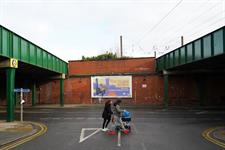Just one in 10 people living in areas prioritised for levelling up funding trust central government to make decisions on spending in their communities, according to a new study.
YouGov polling for the The Law Family Commission on Civil Society revealed that nearly two-thirds of people in the priority areas want decisions on how to spend levelling up funding taken by local government or community groups and charities.
Just 10 per cent want decisions to be made by the central government.
The commission, a two-year initiative that was launched in December to examine how the potential of civil society can be unlocked across the UK, is calling for greater investment in social infrastructure and grassroots initiatives to foster civil society in communities.
Its latest report, Why Civil Society is Essential to Levelling Up, argues that charities, community groups and volunteers should be empowered to bring lasting change to their communities, pointing to evidence that a strong civil society helps increase social capital, neighbourliness and trust within an area.
The report, produced by the research charity Pro Bono Economics on behalf of the commission, also highlights how the success of previous attempts at regeneration has depended on community involvement and the strength of civil society.
Yet research shows that the areas most in need of levelling up are also the ones in which civil society is weakest.
The commission’s analysis of the NHS Volunteer Responders scheme found that the most deprived parts of the country had twice the demand for help from NHS volunteer responders during the pandemic, but they had 3.7 times fewer volunteers, leading to many requests for support going unmet.
The wide-ranging report also raises concerns that 95 per cent of the proposed £172bn in levelling up funding has, to date, been earmarked centrally by the government for physical infrastructure such as rail, road and broadband investments.
The report’s key recommendations include direct investment to maximise the impact of civil society and reverse local declines, creating funding and support for social infrastructure and investment in a development programme for local leaders.
It also calls for the establishment of levelling up partnerships between local government, public services, civil society and the private sector.
The report reiterated the commission’s earlier call for a national Civil Society Catapult Centre, building on a model used to support innovation used in business to help drive forward progress on issues such as improving skills and digital adoption in the sector.
Matt Whittaker, chief executive of Pro Bono Economics, said: “Politicians of all stripes have attempted and failed to deal with the UK’s dire performance on regional inequality for several decades.
“The latest effort to ‘level up’ the country, while much needed, will suffer the same fate unless its architects learn from the past and give a full role to the local charities, community groups and volunteers that together form the nation’s civil society.
“Succeeding where others have failed, and making a real difference to people’s lives, is possible if we make the right investment in civil society and social infrastructure, alongside a clear effort to empower local leaders.”
Just last week charity leaders backed other recommendations by the commission that were part of a cross-sector strategy needed to plug a “data chasm” across the sector.
